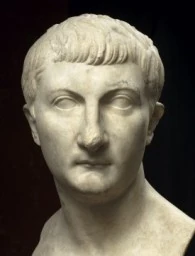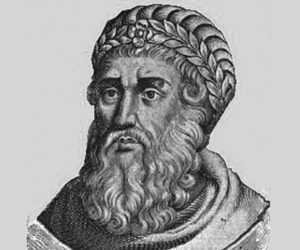Death of King Herod
King Herod’s death occurred shortly after the birth of Jesus of Nazareth making it the lynch pin date to determine the birth year of Jesus, but the year isn’t easy to determine. Standardized calendars during Antiquity do not exist; instead, timelines and dates are linked to well-known historical events.
Establishing the date of Herod’s death requires piecing together such clues as the reigns of Tiberius, King Herod and his sons; the Battle of Actium; the Jewish religious calendar; astronomy data; history accounts; etc.[1] Nativity accounts of both Matthew and Luke report that Jesus of Nazareth was born during the lifetime of Judean King Herod.[2]
Adding another level of complexity is “inclusive reckoning” focusing on whether a partial year was counted as a full year in historical references. The unsettled question instills a potential plus or minus factor of at least a year.[3]
Historian Flavius Josephus is among the primary source in his books Antiquities and Wars for determining when rulers lived, how long they ruled, when they died, etc. Josephus wrote that Herod’s death occurred between the bookend events of a lunar eclipse and the following Passover that Spring.[4]
Jewish Passover is always observed at the first full moon of the year. Historical astronomy data provided by NASA is virtually undisputed.
Tiberius Caesar began his rule as Emperor of Rome upon the death of Caesar Augustus on August 19, 14 AD. History recognizes Tiberius ruled for almost 22 1/2 years.
According to Josephus, King Herod ruled for 37 years.[5] Philip, his son, also ruled for 37 years (Herod in the excerpt below is Herod Antipas) noting it says “the twentieth year of the reign of Tiberius.” [6]

“…Philip, Herod’s brother, departed this life, in the twentieth year of the reign of Tiberius after he had been tetrarch of Trachonitis, and Gaulonitis, and of the nation of Bataneana also thirty-seven years.” – Josephus (*printed)
Gutenberg-printed copies of Antiquities say that Philip died in the 20th year of Tiberius. NASA data for Jerusalem in 4 BC shows a partial, less-than-half, lunar eclipse occurred on March 13th, 4 BC, followed four weeks later by Passover on April 10th.
Determining Herod’s death year seems somewhat simple – subtract the 37 years of Philips rule from year of Tiberius’s rule (14 AD plus 20 years for the rule of Tiberius [34 AD], minus 37 of Philip’s rule) landing in 3 BC. Thus, secular history marks Herod’s death in 3 BC strongly supported by the partial lunar eclipse in 4 BC.
NASA lunar data for Jerusalem reveals another option where a lunar eclipse occurred on January 9-10, 1 BC. Passover that year was observed on April 7th.[7]
Four weeks spans between Herod’s death and Passover in the 4 BC scenario while in the 1 BC scenario the interval is 12 weeks. Some people question if all the events described by Josephus could have transpired in just 4 weeks in 4 BC.[8]
Many communications occurred during an era without telephones, computers, TV when news traveled no faster than a horse could run. News of the King Herod’s death spread across Judea and to other nations and Antiquities describes in detail events that occurred in the interim before the upcoming Passover.
International dignitaries and top military personnel including centurions, captains and officers of the Thracians, Germans, Galatians and Gauls with full regiments wearing battle gear, traveled to the King’s funeral in Jericho. Meanwhile, a funeral bier was built of gold embroidered by “very precious stones of a great variety” and lined with purple material.
After the funeral, an elaborate and slow procession to Herodium for the King’s interment took many more days. Following the King’s burial was a 7-day morning period, then a feast was given for the people of Judea by Archelaus, Herod’s son.
Meanwhile, an uprising among the Jews took place over King Herod’s actions with the Temple and resulting executions marked by the eclipse. Archelaus subdued and killed many of these revolters, then set sail for Rome during the Passover.
Consultant and Biblical hobbyist, David Beyer, compared the 1544 Gutenberg printings of Antiquities to two dozen older, handwritten manuscripts predating the Gutenberg press. He discovered all older handwritten Antiquities manuscripts said that Philip died in the 22nd year of Tiberius, not the 20th year.[9]
Beyer’s discovery changed the calculus of the death of King Herod to the 1 BC timeframe. This timeline aligns with other historical information in Antiquities.
Among them, Agrippa, in 36 AD, said to Caius in a carriage ride that he wished Tiberius would die. The carriage driver told Tiberius who had Agrippa thrown into prison.[10]
Tiberius died in 36 AD when his successor, Caius (Caligula), appointed Marullus as procurator; released Agrippa from prison and gave the open tetrarchy of Philip to him. It is highly unlikely the tetarchy of Philip was left unfilled for 3 years.
Aretas and Antipas went to war “when all of Herod’s [Antipas] army was destroyed by the treachery of some fugitives, who, though they were of the tetrarchy of Philip, joined with Aretas’s army.”[11] Secular historians date the Aretas-Antipas war to 36 AD.
Did Herod’s death actually occur in 1 BC or the traditionally accepted year of 4 BC?
Updated November 12, 2025.

This work is licensed under a Creative Commons Attribution-NonCommercial-NoDerivatives 4.0 International License.
REFERENCES:
[1] Josephus, Flavius. Antiquities of the Jews. Trans. and commentary. William Whitson. The Complete Works of Josephus. 1850. Book XV, Chapter V, Book XVII, Chapters VI – Chapter VIII. <http://books.google.com/books?id=e0dAAAAAMAAJ&printsec=frontcover&source=gbs_ge_summary_r&cad=0#v=onepage&q&f=false> Josephus, Flavius. Wars of the Jews. Trans. and commentary. William Whitson. The Complete Works of Josephus. Book I, Chapter XXXIII. “Actium (31 BCE).” 1850. <http://books.google.com/books?id=e0dAAAAAMAAJ&printsec=frontcover&source=gbs_ge_summary_r&cad=0#v=onepage&q&f=false> Livius.org. Ed. Jona Lendering. 2019. <https://www.livius.org/articles/battle/actium-31-bce> “King Herod the Great.” Livius.org. Ed. Jona Lendering. 2017. <http://www.livius.org/he-hg/herodians/herod_the_great01.html> “The Actium Project.” New World Encyclopedia. The University of South Florida and the Greek Ministry of Culture. Dir. William M. Murray. Research Project. 1997. <http://luna.cas.usf.edu/~murray/actium/brochure.html> Chesser, Preston. “The Battle of Actium.” Ohio State University. 2002. <http://ehistory.osu.edu/articles/battle-actium> Gertoux, Gerard. “Herod the Great and Jesus: Chronological, Historical and Archaeological Evidence.” Academia.edu. n.d. <https://www.academia.edu/2518046/ Gertoux, Gerard. “Dating the death of Herod.”2015 Academia.edu. <http://www.academia.edu/2518046/Dating_the_death_of_Herod/a> “World History 50-0 BC.” HistoryCentral.com. MultiEducator, Inc. n.d. <http://www.historycentral.com/dates/50bc.html> Jewish Encyclopedia. 2011. <http://www.jewishencyclopedia.com/articles/7598-herod-> “Tiberius.” Encyclopædia Britannica. 2023. <https://www.britannica.com/biography/Tiberius> Wolfram, Chuck. “The Herodian Dynasty.” 2004. <http://web.archive.org/web/20151013221102/http://freepages.history.rootsweb.ancestry.com/~cwolfram/herod> Martin, Ernest L. The Star of Bethlehem – The Star That Astonished the World. 2nd Ed. 2003. Chapter 13. A.S.K. (Associates for Scriptural Knowledge. <://web.archive.org/web/20170917115234/http://www.askelm.com/star/star015.htm> Bunson, Matthew. Encyclopedia of the Roman Empire. “Astronomy.” New York: Princeton University Library. Internet Archive. 2002. <https://archive.org/details/isbn_9780816045624> San José, Juan Antonio Revilla. “On the Year of Herod’s Death.” A partial translation from “La Fecha de Muerte de Herodes y La Estrella de Belén.” pp 14, 140. 28 Dec 1999. Astrology of the New Centaurs. <http://www.expreso.co.cr/centaurs/steiner/herod.html>
[2] Matthew 2. Luke 2.
[3] The Historical Method of Flavius Josephus. 1986. p14. <http://books.google.com/books?id=kdUUAAAAIAAJ&lpg=PA14&ots=2ek7SgCy2c&dq=josephus%2C%20battle%20of%20actium%2C%20herod&pg=PA14#v=onepage&q=josephus,%20battle%20of%20actium,%20herod&f=false>”What is Inclusive Reckoning?” WednesdayCrucifixion.com. 2024. <https://www.wednesdaycrucifixion.com/inclusive-reckoning.html#:~:text=The%20common%20mode%20of%20counting%20employed%20in%20the,nations%2C%20as%20is%20shown%20unmistakably%20by%20source%20documents> “Reckoning Tiberius’s Reign and Jesus’s Baptism.” TyndaleHouse. 2022. p 100, #3 “Way that Tiberius’s Reign May Have Been Reckoned in Antiquity”. <file:///Users/vogelman/Downloads/37789-reckoning-tiberius-s-reign-and-jesus-s-baptism-first-and-second-century-evidence-concerning-tiberius-s-fifteenth-year-luke-3-1.pdf.> Steinmann, Andrew E.; Young, Rodger. Academia.Edu. “Elapsed Times for Herod the Great in Josephus.” 2023. <https://www.academia.edu/39731184/Elapsed_Times_for_Herod_the_Great_in_Josephus?email_work_card=thumbnail>
[4] Josephus. Antiquities. Book XVII, Chapter VI.4. Josephus, Flavius. Wars of the Jews. Chapter XXXIII; Book II, Chapter I. The Complete Works of Josephus. 1850. <http://books.google.com/books?id=e0dAAAAAMAAJ&printsec=frontcover&source=gbs_ge_summary_r&cad=0#v=onepage&q&f=false>
[5] Josephus. Antiquities of the Jews. Book XVIII, Chapters IV.6. (printed copy).
[6] Whiston, William. The Works of Flavius Josephus, the Learned and Authentic Jewish Historian.” 1850. Book XVII, Chapter VI footnote t. <https://books.google.com/books?id=e0dAAAAAMAAJ&printsec=frontcover&source=gbs_ge_summary_r&hl=en#v=snippet&q=349&f=false> CR Whiston. Book XI, Chapter V, footnote t. Bernegger, P.M. “Affirmation of Herod’s Death in 4 B.C.” Journal of Theological Studies. 1983. Vol. 34, no 2, pp 526-531, <http://www.redatedkings.com/postings/Bernegger.pdf> Schurer, Emil. A History of the Jewish People in the Time of Jesus Christ. 1890. Volume 1, pp 464-465, footnote 165. <http://books.google.com/books?id=BRynO3W9FPcC&pg=PP1#v=snippet&q=Tiberius&f=false>Doig, Kenneth F. New Testament Chronology. 1990. Chapter 4. <http://nowoezone.com/NT_Chronology.htm> Philip. Bible Wiki. image. n.d. <https://bible.fandom.com/wiki/Philip_the_Tetrarch>
[7] Espenak, Fred. NASA Lunar Eclipse Website. 2007. Asia and Asia Minor – Jerusalem, Israel; Century Selection -0001 – 0100. <https://eclipse.gsfc.nasa.gov/JLEX/JLEX-AS.html> Espenak, Fred. “Six Millennium Catalog of Phases of the Moon.” NASA Eclipse Website. n.d. “Phase years Table: -0099 – 0000.” <https://archive.is/UsEwe> Kidger, Mark R. “The Date of Passover 11BC – 10AD.” <http://www.observadores-cometas.com/cometas/Star/Passover.html> Reinhold. “Other Scholarship Proving the Exact Date of Birth of Yeshua (Jesus), pt 5.”’
[8] Bernegger, P.M. “Affirmation of Herod’s Death in 4 B.C.” Journal of Theological Studies Vol. 34, no 2, pp 526-531, 1983. RedatedKings.com. n.d. <http://www.redatedkings.com/postings/Bernegger.pdf> “The Infamous Procurators of Rome 6 -66 CE. Ed Jan Lilleby. Grace Panorama. n.d. <https://www.gracepano.com/language/en/2023/04/06/the-infamous-procurators-of-rome-in-6-66-ce/> “Did Caesar and Cleopatra really have a son?” The Ancient Standard. 2010. <http://ancientstandard.com/2010/12/03/did-caesar-and-cleopatra-really-have-a-son>
[9] Beyer, David W. “Josephus Reexamined: Unraveling the Twenty-Second Year of Tiberius.” Chronos, Kairos, Christos II. Ed. Jerry Vardaman. 1998. <http://books.google.com/books?id=mWnYvI5RdLMC&lpg=PP1&dq=isbn%3A0865545820&pg=PA85#v=snippet&q=beyer&f=false> Jachowski, Raymond. Academia.Edu. “The Death of Herod the Great and the Latin Josephus: Re-Examining the Twenty-Second Year of Tiberius.” n.d. https://www academia.edu/19833193/The_Death_of_Herod_the_Great_and_the_Latin_Josephus_Re_Examining_the_Twenty_Second_Year_of_Tiberius>
[10] Jospehus. Wars. Book II, Chapter IX.5. Villalba i Varneda, Pere. The Historical Method of Flavius Josephus. 1986. p14. <http://books.google.com/books?id=kdUUAAAAIAAJ&lpg=PA14&ots=2ek7SgCy2c&dq=josephus%2C%20battle%20of%20actium%2C%20herod&pg=PA14#v=onepage&q=josephus,%20battle%20of%20actium,%20herod&f=false>
[11] Josephus. Antiquities. Book XVIII, Chapter V.1. “Herod Antipas.” Britannica Encyclopedia. 2022. <https://www.britannica.com/biography/Herod-Antipas> “Aretas.” Bible History. 2022. <https://bible-history.com/links/aretas-1067> “Aretas ( in Aramaic ) IV.:” Jewish Encyclopedia. n.d. <https://www.jewishencyclopedia.com/articles/1752-aretas>

